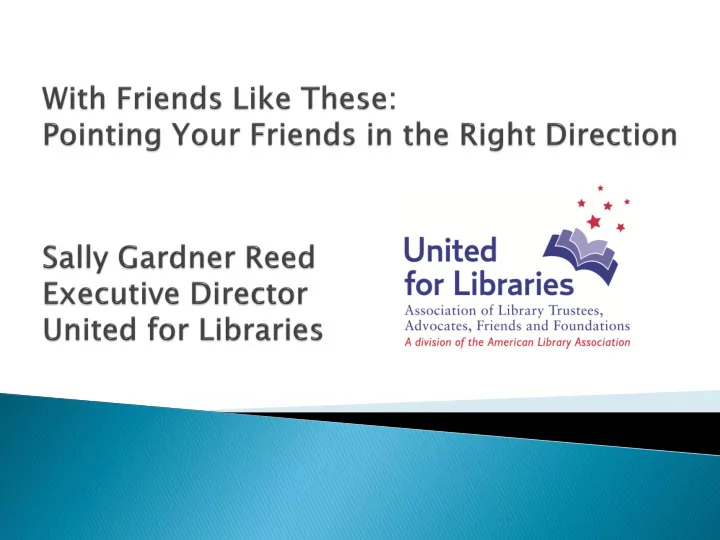

Friends are: Advocates for the Library! Fundraisers! Community Cheerleaders!
Great Communication It’s a two way street Attend meetings and invite a Friends liaison to Board Meetings Mutual Respect The Friends work hard for the money The Director knows best about library priorities Sharing the Future with Your Friends Let the Friends know every year what the library’s challenges and opportunities will be
Misunderstanding about Roles Friends don’t make purchasing decisions Friends don’t make or dispute library policy Friends hold community donations in trust for the library: It’s not THEIR money
Friends Spending on Other Organizations Should only happen when library concurs (literacy initiatives, for example) Breach of trust with donors who think their money will support the library!
Saving “Their” Money for a Rainy Day It’s pouring outside! Donors want their donations spent on the library, not keeping a checking account richly padded “Need” is a strong motivator for fundraising
One or More Friends’ Leaders Doesn’t like the Director or has other Personal Beef If the Friends can’t/don’t want to support the library including the director, it’s time for these folks to move on – they’re no longer Friends No one member of the Friends board has more authority than any other board member
Be a Friend – join the group – checkbook member only! Give the Friends and their gifts LOTS of publicity and grateful acknowledgement. Provide Friends with a prioritized wish list – based on the annual Friends talk about the library’s future challenges and opportunities Attend their events.
Be brave, open a discussion with the Friends Board about your relationship You don’t have to do it alone, invite a “friendly” Trustee Center the discussion on your mutual priority - the library Use a “neutral” facilitator – one not aligned with either group – but discuss problems with him/her in advance
Develop Mutual Working Documents for Operating Together in the Future Memorandum of Understanding Library’s commitment to supporting Friends Guidelines for giving The role of the Friends board
With Friends Like These Potentially hurt library’s reputation Keeping a high functioning group from being established because they hold the name “Friends” Loss of funding for library programs and services
Time to take back your good name. The library’s reputation is its greatest asset It’s the responsibility of the library board (if governing) or the library’s governing body (city/county council, mayor, city manager) to ensure that the library’s reputation is not damaged or potentially damages by dysfunctional Friends.
Letter from Proper Library Governing Authority to Friends President: Thank you for past support Efforts towards a solution aren’t working You may no longer use the library’s name in fundraising. Letter to the editor making the same points above: do not use personal names, be polite, be optimistic – “we’re hoping this move will allow a new Friends group to emerge!”
The Role of the Friends Board: http://www.ala.org/united/sites/ala.org.united/files/ content/friends/factsheets/unitedfactsheet10.pdf Guidelines for Giving: http://www.ala.org/united/sites/ala.org.united/files/ content/friends/factsheets/unitedfactsheet22.pdf Sample Memorandum of Understanding: http://www.ala.org/united/sites/ala.org.united/files/ content/friends/factsheets/unitedfactsheet25.pdf Library Support for Friends Activities: http://www.ala.org/united/sites/ala.org.united/files/ content/friends/factsheets/unitedfactsheet26.pdf When Friends Aren’t Friendly: http://www.ala.org/united/sites/ala.org.united/files/ content/friends/factsheets/unitedfactsheet27.pdf
Available Jan. 2017 Order at www.alastore.ala.org Provides guidance for developing a Friends group for public and academic libraries; Explains how to merge a Friends group with a Foundation; Gives pointers on encouraging Friends to attract new and active members, working with the Friends board to develop leadership skills, and other crucial partnership strategies; Addresses the sticky situation of “unfriendly” Friends, with sage advice on handling Friends who seem unmotivated when it comes to fundraising or advocacy, are uncommunicative, overstep their bounds, and other difficult issues; and Shares fundraising, advocacy, programs, and membership development best practices from Friends groups across the country.
Sally Reed Executive Director sreed@ala.org Beth Nawalinski Deputy Executive Director bnawalinski@ala.org Jillian Wentworth Marketing/PR Specialist jwentworth@ala.org www.ala.org/united united@ala.org (800) 545-2433, ext. 2161
Recommend
More recommend